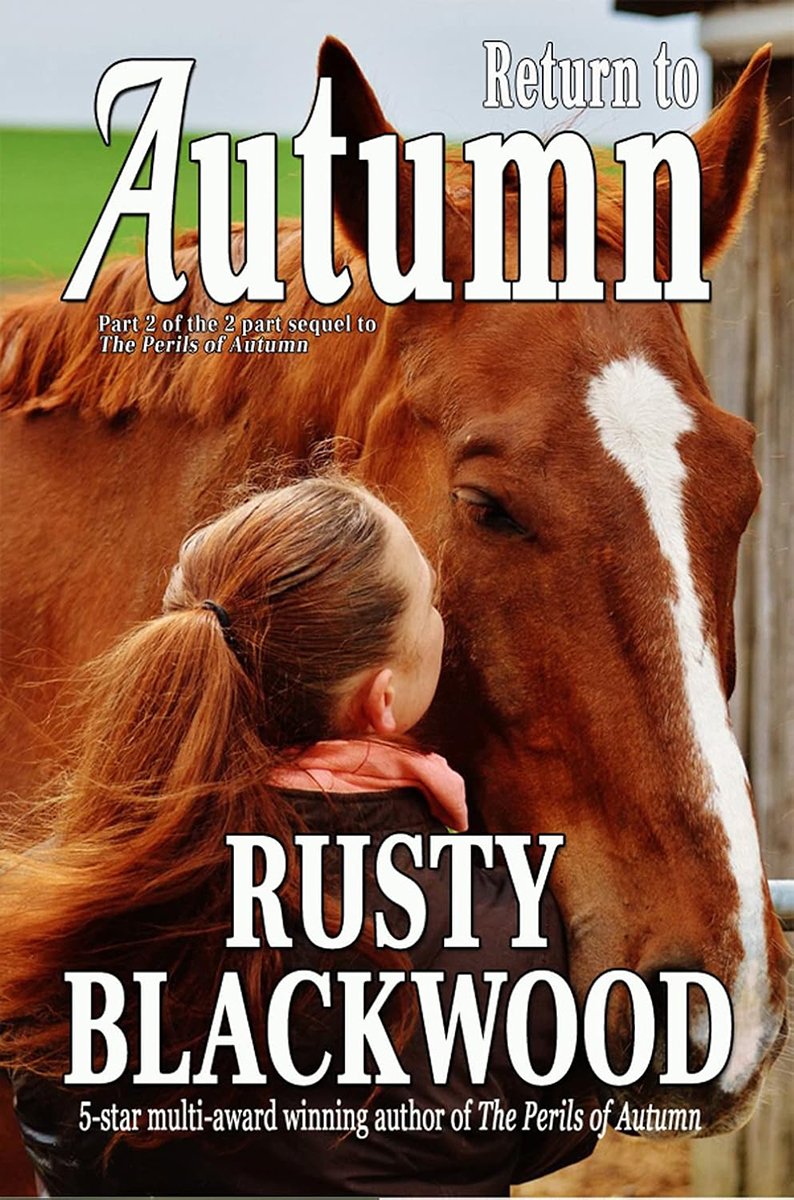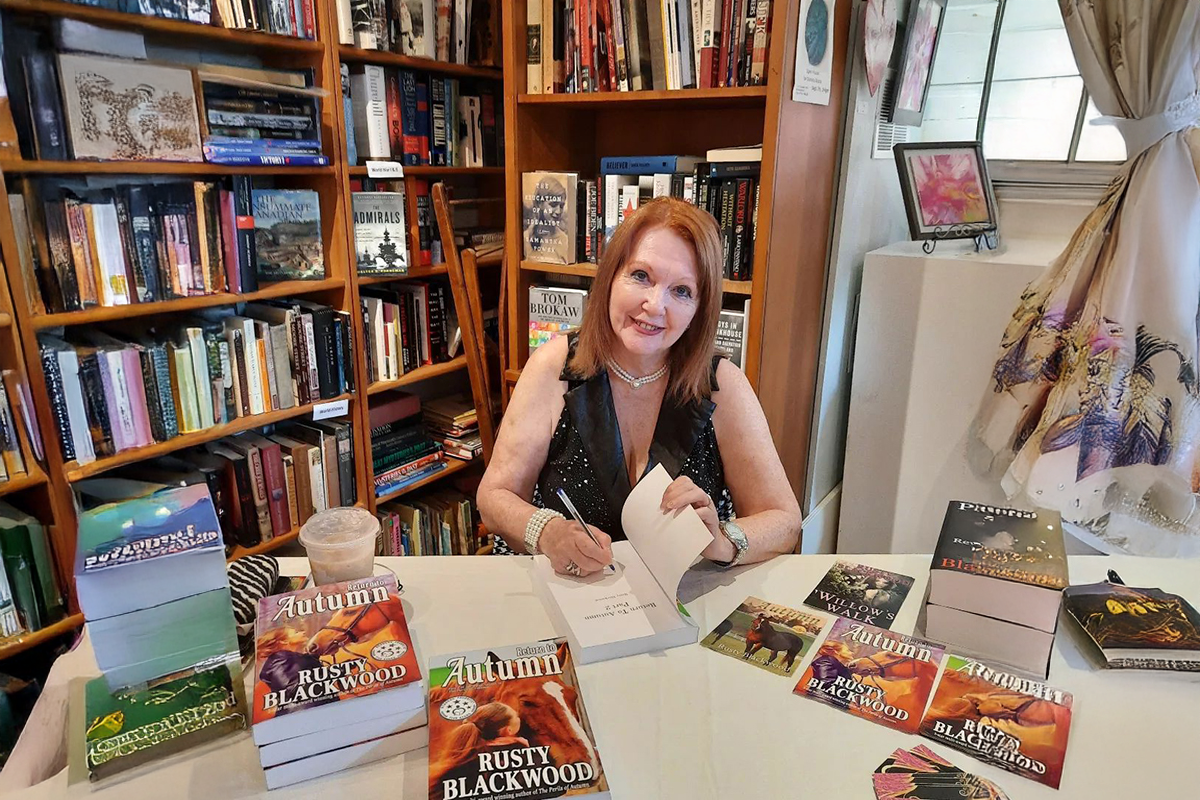PHOTO: Rusty Blackwood at a book signing event, smiling as she autographs books for her fans, surrounded by stacks of her works in front of a bookshelf.
Master Storyteller Of Romance And Comedy
Rusty Blackwood discusses her Autumn trilogy, Derwood Tugbottom comedies, and creative process, sharing insights on character development, balancing romance and suspense, and her lifelong passion for storytelling and the arts.
Rusty Blackwood is a storyteller who paints with words as vividly as a painter with oils, each novel a canvas of emotion, colour, and movement. From the sweeping romance of The Perils of Autumn to the light-hearted hilarity of the Derwood Tugbottom comedies, her writing exudes a passion for narrative that is at once intense and immersive. Born in southwestern Ontario, Blackwood carries the textures of her upbringing—rolling hills, lush pastures, and the rhythms of rural life—into her work, infusing her stories with a sense of place that feels both familiar and transported.
Her Autumn trilogy, culminating in Return to Autumn: Part 2, exemplifies her gift for balancing romance and suspense, weaving intricate human drama against the backdrop of equestrian elegance. Characters like Autumn Leeves and Cyril Landon are as tangible as they are compelling, yet it is often the quieter figures, such as Agnes Harris, who reveal the subtle depths of her characterisation. There is a sincerity to her narratives, an understanding that love, loss, and ambition are never simple, and that true storytelling honours both the light and the shadows.
Beyond the romance, Blackwood’s creative versatility is striking. Her Derwood Tugbottom series—gifted by her late brother—demonstrates her ability to shift effortlessly into comedy, embracing whimsy without sacrificing the emotional resonance that permeates her work. Whether exploring the heartbreak of Passions in Paris: Revelations of a Lost Diary or the eccentric escapades of Derwood, her voice remains unmistakably hers: bold, empathetic, and alive with curiosity.
Blackwood’s devotion to craft, informed by poetry, performance, and a lifelong love of the arts, shines through in every page she writes. Her advice to aspiring authors—write what you know, embrace critique, and pursue passion with unwavering confidence—resonates as much as her fiction, a reminder that storytelling is as much an act of courage as it is of imagination. Through her novels, she invites readers not just to observe worlds, but to inhabit them fully, breathing in the textures, emotions, and possibilities she so masterfully creates.
What inspired you to set the Autumn series in 1970s Kentucky, and how did you research the era’s equestrian culture?
The 70’s was my favourite decade thus far in my life. I was in my 20’s and finding adventure at every turn. I’ve followed the American Triple Crown for eons, so I researched that era of equestrian life in Kentucky through Google Search. I have never been to Kentucky personally, but it is very similar to the area where I grew up in south-western Ontario with rolling hills, lush grass, and pastures with horses grazing within.
How did you balance the sweeping romance and high-stakes suspense in Return to Autumn Part 2 without letting one overpower the other?
Return to Autumn Part 2 was the concluding novel in the trilogy, so each character required their tie-ups. The novel finally reveals Duff Taylor’s deep kept secret and the person that secret involved, plus what he caused to Autumn, and he faces Cyril Landon’s wrath.
Which character in the Landon Lawns saga has surprised you the most with their development, and why?
That would be Agnes Harris. She has been in love with Cyril Landon from childhood and though he loves her too, it is only as a good friend, so she has to come to terms with that and accept his first wife, and later, his second. Agnes has endured a difficult life fully as much as Cyril Landon, coming from meager beginnings and has strived for everything she has managed to receive, the same as Cyril.
What draws you to write both intense romantic drama and light-hearted Derwood Tugbottom comedies, and how do you switch creative gears?
I’m a hopeless romantic at heart, always have been, so I love to create stories that capture this scenario and set them in places and eras of my liking. My late brother Rick created Derwood Tugbottom and gifted the character to me back in 2012 to do with as I wished. That gift began the Derwood series of books. Because of this, Derwood is most special, and a great outlet for silly emotions. Derwood came about quite innocently, but because of his origins he is one of my dearest characters if not my dearest. Since my brother’s passing last December, I’ve not been able to write a new installment to the Derwood comedy series, but with time, I shall.
Could you share a particular scene from any book that left you emotionally drained after writing it?
When I wrote Chapter 60, The Three People in This Room, from Passions in Paris: Revelations of a Lost Diary, the protagonist Joy Wyhmere thinks her love, Cullen Malone, is dying and to write her reaction of the scene, I pulled from my father’s death. It is a powerful area of the novel.
How has living in St Catharines influenced the settings or themes in your stories?
St. Catherines is known as The Garden City, and rightfully so. You find manicured lawns and intricately designed flowerbeds everywhere throughout the entire area. The city is located on the Niagara Peninsula which sits on the south-western shores of Lake Ontario, so the setting is beautiful to stimulate the imagination.
Your poetry background is evident in your prose style; do you still write poems, and might a new collection be forthcoming?
Thank you for your kind words. I don’t compose poems as much as I once did because my novels take a lot of my time, however, I still write the odd poem; have a number of them that have not yet been published, and I do intend on a new collection, which will be my final collection.
What single piece of advice would you give to aspiring romantic fiction authors trying to find their unique voice in a crowded market?
First and foremost, write what you know about or have experience with. Research is a must, even with experience for there is always something new to learn. Be realistic, and be able to accept critique and rejection, as both will come your way, but build from critique, as that helps you see where you can improve in both the writing as well as the story you’re creating. Have confidence in your ability, and don’t let anyone tell you it can’t be done. Most of all, enjoy yourself, for if you can enjoy what you write, chances are others will too.
EDITOR’S CHOICE
Rusty Blackwood delivers an engrossing, emotionally charged finale with compelling twists and deeply layered characters. A must-read conclusion!



